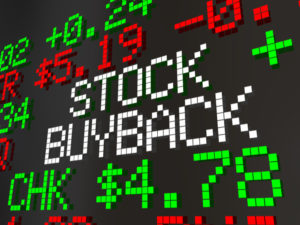
By iQoncept @ Shutterstock.com
The pols are out trying to punish firms that buy back their own shares. The left wants to ban buybacks unless a company agrees to a litany of their demands. The right wants to put buybacks and dividends on equal footing by taxing buybacks.
Neither approach is a good idea. If the government bans buybacks, acquisitions and conglomeration are likely to increase—both have a higher probability of destroying value.
The politicians are attacking this from the wrong direction. As we have written in the past, buybacks started to soar in the 1990s after executive pay for public firms became non-deductible. The unintended consequence was a surge in stock option issuance, greater buybacks to increase the value of those stock options, and a widening gap between what executives make and what the average worker makes.
Change the incentive for companies to compensate their top executives with stock options, and buybacks would likely fall out of favor with management teams. Go a step further and eliminate the tax on dividends and there would be even less justification for buybacks.
The WSJ summarizes.
Yet politicians are now targeting buybacks to claim tax reform hasn’t worked. Senators Chuck Schumer and Bernie Sanders have suggested a ban on buybacks. To get an exemption from the ban, companies would have to fulfill a progressive wish list: pay wages of $15 an hour, provide “decent pensions” and more. The Senators criticize Walmart for announcing “plans to spend $20 billion on a share repurchase program while laying off thousands of workers and closing dozens of Sam’s Club stores.”
Florida Republican Marco Rubio is taking his own swing at stock repurchases, with no better logic. He tweeted recently that he is writing a bill to “tax corporate buybacks same way as dividends. No tax advantage for buybacks over dividends.”
It’s hard to know what this means precisely without seeing the details. But say a company with 100 shares did a buyback of shares worth $200. Mr. Rubio’s plan reportedly would treat that like a deemed dividend of $2 per share, applicable to all stockholders, regardless of whether they sold. Meantime, everyone’s cost basis would be raised by the same amount, reducing the eventual capital gain by $2 per share. It’s theoretically a wash, except the tax would have to be paid up front.
Read more here.
